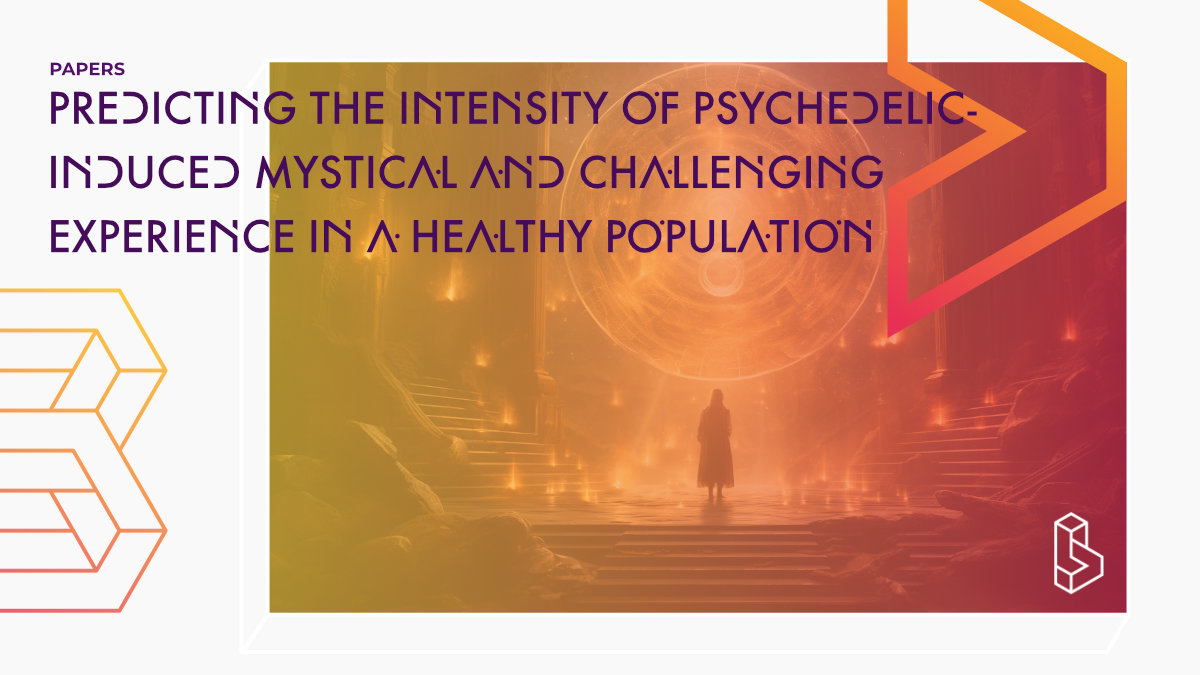In a Phase I RCT (n=89), this analysis aimed to predict the intensity of mystical and challenging experiences during psilocybin therapy for depression. It found a strong positive correlation between psilocybin dosage and experience intensity. Age was negatively linked to challenging experiences. Personality traits had minimal impact, except for a positive connection between neuroticism and high-dose difficult experiences. No significant links were found with affect.
Abstract of Predicting the Intensity of Psychedelic-Induced Mystical and Challenging Experience in a Healthy Population: An Exploratory Post-Hoc Analysis
“Introduction In psychedelic therapy, mystical as well as challenging experience may influence therapeutic outcome. However, predictors of such experience have not been sufficiently established. Determining predictors of their intensity is, therefore, potentially beneficial in targeting psilocybin therapy for depression.
Methods In a post hoc data analysis of a Phase 1, randomised, double-blind, placebo-controlled, between-groups clinical trial, dosage, personality traits, affect, and individual data were analysed as possible clinical predictors. Eighty-nine healthy volunteers were randomised to receive a single dose of placebo, 10 mg of psilocybin, or 25 mg of psilocybin. ANOVA was used to analyse the relationship between dosage and mystical and/or challenging experience, and correlation analysis for all other variables.
Results The intensity of both mystical and challenging experience was strongly associated with higher dosage. Age was negatively correlated with intensity of challenging experience. Correlation between identified personality traits and either mystical or challenging experience was minimal, with the exception of positive correlation between neuroticism and challenging experience at higher dose. Neither positive nor negative affect indicated correlation with the intensity of either type of experience.
Discussion A limitation of this study is its post hoc, exploratory design; recommendations for further research are provided.”
Authors: Kwonmok Ko, Ben Carter, Anthony J. Cleare & James J. Rucker
Summary of Predicting the Intensity of Psychedelic-Induced Mystical and Challenging Experience in a Healthy Population: An Exploratory Post-Hoc Analysis
Introduction
Psychedelics are psychoactive drugs currently under active clinical research, notably in treatment-resistant depression. Mystical experiences are commonly reported during acute phases of the drug’s action, and may be predictive of long-term positive changes in psychiatric disorders.
Oceanic boundlessness is one measure of ME and has a Pearson correlation of 0.93 with the Mystical Experience Questionnaire.
Psychedelic-induced challenging experiences include physical reactions such as headaches, increased heart rate, blood pressure, and respiration rate, and psychological reactions such as transient distress, anxiety, and dread of ego dissolution.
Find this paper
https://doi.org/10.2147/ndt.s426193
Open Access | Google Scholar | Backup | 🕊
Cite this paper (APA)
Ko, K., Carter, B., Cleare, A. J., & Rucker, J. J. (2023). Predicting the Intensity of Psychedelic-Induced Mystical and Challenging Experience in a Healthy Population: An Exploratory Post-Hoc Analysis. Neuropsychiatric Disease and Treatment, 2105-2113.
Study details
Compounds studied
Psilocybin
Topics studied
Depression
Study characteristics
Original Re-analysis
Placebo-Controlled
Double-Blind
Randomized
Participants
89
Humans
Compound Details
The psychedelics given at which dose and how many times
Psilocybin 10 - 25μg | 1x
Linked Research Papers
Notable research papers that build on or are influenced by this paper
The effects of psilocybin on cognitive and emotional functions in healthy participants: Results from a phase 1, randomised, placebo-controlled trial involving simultaneous psilocybin administration and preparationThis Phase I RCT indicates that 10mg and 25mg doses of psilocybin are generally well-tolerated when administered to up to 6 participants simultaneously. Participants (n=89) each received one-to-one psychological support during the sessions. 511 treatment adverse events (TEAEs) were reported, 67% of which were resolved on the day of administration in the largest published trial with psilocybin to date.

